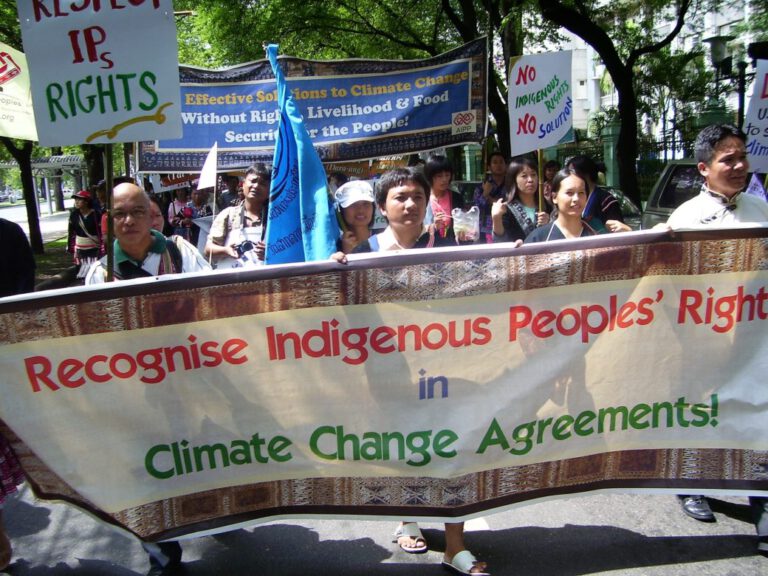
The text is a modified version of IBON International’s intervention at the Global Major Groups and Stakeholders Forum of the United Nations Environmental Programme held on 9 February 2022.
IBON International welcomes the opportunity to give comments and recommendations to the United Nations Environmental Programme’s Draft Medium-Term Strategy for 2022 – 2025, particularly on the theme on climate action. We are engaging the UNEP in the shaping of this landmark document in the hopes of contributing to the development of rights-based, gender-just, and people-centered climate action policies of the organization.
Article 3 of the United Nations Framework Convention on Climate Change (UNFCCC) upholds the no-harm principle, the polluter pays principle, the precautionary principle, common but differentiated responsibilities and capacities (CBDR-C) and sustainable development to guide the efforts of Parties in addressing climate change. Against the background of developed countries’ continued reneging on their commitments, especially under the current global context, it is crucial to reiterate the relevance of these principles.
Enhancing climate transparency and accountability should not only be about tracking and reporting on countries’ climate actions: it should also consider developed countries’ debt towards developing countries on account of colonial plunder, environmental destruction, and the capture of the atmospheric space to emit greenhouse gases. Currently, this is not the case.
We are deeply concerned that the historical responsibility for climate change is being lost in the UNEP’s avowed focus for climate action on “high emitting countries” and “high emitting sectors.” This is a regression from the CBDR-C principle that recognizes that while action is demanded from all, developed countries in the global North who have the larger accumulated historical emissions are more responsible for the current climate crisis. Thus, developed countries need to continue to take the lead in emission reductions and in helping developing countries with the provision of finance, technology transfer and capacity building as agreed in the UNFCCC. We recommend that the MTS document reflect this crucial nuance and recover the CBDR-C as its grounding principle for climate action.
Enhancing climate transparency and accountability should not only be about tracking and reporting on countries’ climate actions: it should also consider developed countries’ debt towards developing countries on account of colonial plunder, environmental destruction, and the capture of the atmospheric space to emit greenhouse gases. Currently, this is not the case. Developed countries keep lowering their ambition, while developing countries are increasingly pressured to compensate for this and relinquish their development space. The ‘bottom-up’ approach to climate pledges has resulted in highly unequal levels of commitment and effort and will not likely help us keep global warming below 1.5 degrees Celsius. We recommend that the MTS help in ensuring that countries’ climate action is commensurate with their responsibility and capability and respect developing countries right to sustainable development.
While the MTS speaks about designing incentives to encourage the private sector‘s shift towards low-carbon and sustainable business models, it has failed to articulate the need to support more robust mechanisms to hold corporations to account. Following the polluter pays principle, we recommend that the MTS advocate for stronger mechanisms to regulate corporate conduct and enhance their liability and for the impacts of their operations to the environment, climate, and society, especially women and children in poor and underdeveloped countries.
We recognize the need to protect biodiversity and contribute to achieve the Paris Agreement goal of protecting ecosystems and communities that depend on them. However, we are critical of the promotion of so-called nature-based solutions to climate change, especially when it is used by dirty industries and sectors to avoid putting the spotlight on their carbon footprint and the destruction of biodiversity and ecosystems from their unsustainable and polluting practices. While carbon offsets are useful for those who want to continue with business as usual, they do not reduce emissions. In some instances, they have led to displacement of local communities from their own land, human rights violations, and destruction of livelihoods of women, Indigenous Peoples, and local communities.
We recommend that UNEP mobilise support for people-powered climate solutions, including agro-ecological farming systems and community conservation of biodiverse ecosystems that protect biodiversity and ecosystem integrity, secure food sovereignty and rights, and provide substantial mitigation benefits.
While so-called impacts of nature-based solutions remain questionable, actions and solutions developed and owned by grassroots communities, in the context of their struggle against fossil fuel and extractive companies and the corporate encroachment on land, water, and other resources, are increasingly gaining traction as viable alternatives to achieve climate justice. We recommend that UNEP mobilise support for people-powered climate solutions, including agro-ecological farming systems and community conservation of biodiverse ecosystems that protect biodiversity and ecosystem integrity, secure food sovereignty and rights, and provide substantial mitigation benefits. The UNEP’s climate action strategy must also contribute to securing land and tenure rights for Indigenous Peoples and local communities.
We recognize that climate action also faces numerous challenges and barriers to implementation.
For one, the pandemic is being used to justify a return to business as usual. So far governments have provided generous relief to oil and gas companies, while largely dismissing clean and renewable energy. We welcome the message to end all subsidies to dirty energy and redirect them towards sustainable energy sources. We recommend further enhancing this message by qualifying that such a shift should be done in a way that does not further harm those already facing poverty and inequality. Instead, this should bolster gender equality, environment, social, economic, and climate justice.
All over the world, democratic and civic spaces are also closing, preventing people from participating in political life and decision-making on public policy. We recommend that the UNEP support the agenda of defending democratic and civic spaces and environmental and other community rights defenders—in recognition of the important role they play in ensuring transformative actions and policies for the people and planet.###